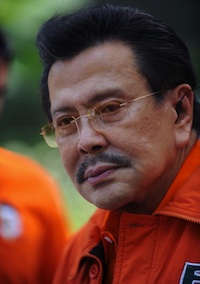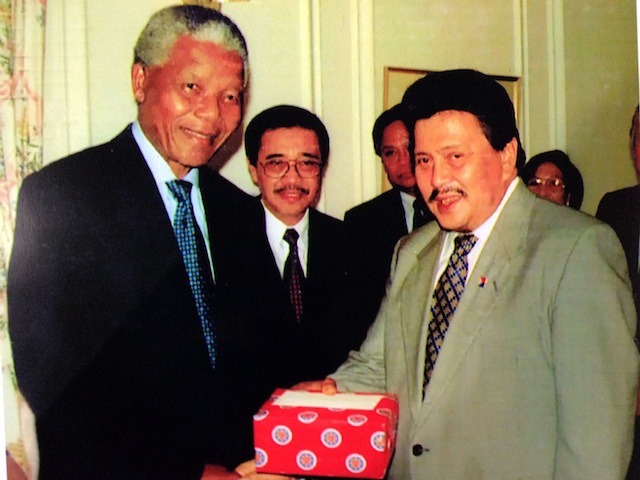SUMMARY
This is AI generated summarization, which may have errors. For context, always refer to the full article.
 On May 10, 1994, as Vice President of the Philippines, I had the privilege of being the official representative of the country to Pretoria for the inauguration of South Africa’s first black president, Nelson Mandela. I stood alongside dignitaries from different nations to celebrate this monumental milestone in the history not only of Africa but of the world: the end of apartheid.
On May 10, 1994, as Vice President of the Philippines, I had the privilege of being the official representative of the country to Pretoria for the inauguration of South Africa’s first black president, Nelson Mandela. I stood alongside dignitaries from different nations to celebrate this monumental milestone in the history not only of Africa but of the world: the end of apartheid.
On that day, President Nelson Mandela stood as a shining beacon of hope for liberty and equality. He stood victorious against a government of oppression and a culture of hatred and racism. Africa was finally free from the bondage of foreign and white minority rule and the applause and cheers in South Africa echoed in every country, including our own.
As a Filipino in this audience of global leaders, I felt proud that the Philippines was ahead in terms of freedom and democracy. The racial classification of blancos, peninsulares, mestizos, tornatas and indios, by which our natives were oppressed by the Spanish regime for their own version of white minority rule, was purged upon our Declaration of Independence in 1898.
In fact, one hundred years later, at my own inaugural address as President of the Philippines in 1998, I stood proud as living proof that our country had a true and working democracy. For how would someone like myself – someone who was supported more by the poor than by the ruling elite – win as president?
Yet in spite of my proclamation as president being hailed as a victory of the Filipino masses, inequality prevailed. Obviously not in terms of racial segregation but in terms of social stratification.
As I assumed the presidency, while the Filipino masses cheered, the ruling class jeered. The aristocrats and oligarchs made no secret of their disdain that someone who resonated the cause of the poor, spoke their language, and shared their sense of humor, had just become president.
In this window of opportunity for real equality, my administration wasted no time to achieve an empowerment of the masses. Instead of undertaking more loans from international financial institutions at the height of the Asian Financial Crisis that greeted my presidency, we empowered our farmers to increase rice production. We also allocated the highest per capita budget for education, for social services, and for health compared to the Ramos, Arroyo and first Aquino administrations.
Our decision to achieve economic progress by empowering the poor immediately paid off. Thanks to the record-breaking agricultural growth rate of 12% in my first year as president (from -6% to +6.6%) – at the time the highest farm output in 20 years – the Philippines was lauded for being the first country to get out of the regional financial crisis. My administration also surprised our critics when we brought inflation down from 12% to 5% in less than two years. We were also lauded by the World Bank for our administration’s efforts to fight corruption.
But there were some decisions to alleviate the plight of the masses that did not rest well with the ruling elite. For instance, the decision not to allow an increase in the prices of electricity and water. Or the decision to keep the prices of gas low. Or the policy of zero government and sovereign guarantees to ensure that our country would not go deeper into debt, in spite of pressure from foreign investors. It was soon made clear to me that my presidency stood in the way of the truly powerful in this country and soon enough, I was forced to step out of their way, stepping down from Malacañang to avoid bloodshed, and replaced by a power-hungry vice president. In the words of former Supreme Court Chief Justice Cecilia Muñoz Palma, the power grab that was Edsa Dos, marked a moment in our history when “the rule of law was thrown out and the rule of force prevailed.”
That the rule of law was “thrown out” to get a duly elected leader our of the way of the elite was further proven when I was offered twice by then Justice Secretary Nani Perez to leave the country, to go to any country of my choice, take anything that I wanted with me, and if I agreed, no charges would be filed against me. Clearly aware of the illegitimacy of Arroyo’s assumption into power, Perez offered me twice to leave the country. Twice I refused.
It was after this refusal to leave the country that over 3,000 policemen arrested me on false charges on April 25, 2001, brought me to Camp Crame, took mugshots that were released to the international press and detained me in a cell in Camp Crame like a common criminal. When hundreds of thousands marched to Edsa to protest my arrest, I was moved to Fort Sto. Domingo in Sta. Rosa, Laguna, then to Veterans Hospital, to Camp Capinpin in Tanay, Rizal, and finally to my house arrest in Tanay in the last two and a half years of my six and a half years of incarceration.
Needless to say, this was the most trying time of my life.
In prison, I clung on to that memory of my trip to Pretoria when I witnessed the triumph of Nelson Mandela over Africa’s oppressors and his victory over their ruling elite. I told myself that just as it took Mandela a lifetime to achieve freedom from apartheid – he spent 27 years in prison and voted for the first time at the age of 75 – I had to be prepared to spend the rest of my life in prison, fighting to regain our true democracy that was stolen by the Arroyo Administration. It was this determination to make a stand for the Filipino people and for the country that kept me strong even behind bars.
A good friend also shared with me a quote from Mandela from his own trial in 1964: “The invincibility of our cause and the certainty of our final victory are the impenetrable armor of those who continue to uphold their faith in freedom and justice in spite of political persecution.” His words resonated in my dark days as I faced my own political persecution. When I regained my own freedom, I would joke that we are both men of conviction!
In 2010, I took inspiration from Mandela once again when I ran for president at the age of 73, keeping in mind that he ran for president at the age of 75. I realized then that when you are truly committed to your cause and to your country, the desire to serve knows no bounds, the ability to forgive is unending, and the capacity to hope is limitless. This is true strength – and you can find it in your heart whatever age you may be.
Today, South Africa and the Philippines face similar challenges: economic development that will result in freedom from poverty. Just this June, South Africa ranked 48th out of 52 countries in terms of its economic outlook. Here in the Philippines, the government is being challenged to present statistics that are reflective of the real state of the nation, with the mismatch between growth and quality of life statistics.
There is no better way to honor this great man, as we pray for the improvement of his health, than by continuing his fight for a real democracy with equal opportunities for all. For while apartheid is gone, indignities remain, with oppressors who condemn inequality on paper but not in practice ultimately preventing society’s emancipation from the chains of poverty.
This is true in South Africa and it is true in the Philippines today. I pray that both our countries achieve this real sense of freedom in our lifetime.
H.E. Joseph Ejercito Estrada is a former President of the Philippines, in office from 1998 to 2001. He is the incoming Mayor of the city of Manila.
Add a comment
How does this make you feel?

There are no comments yet. Add your comment to start the conversation.